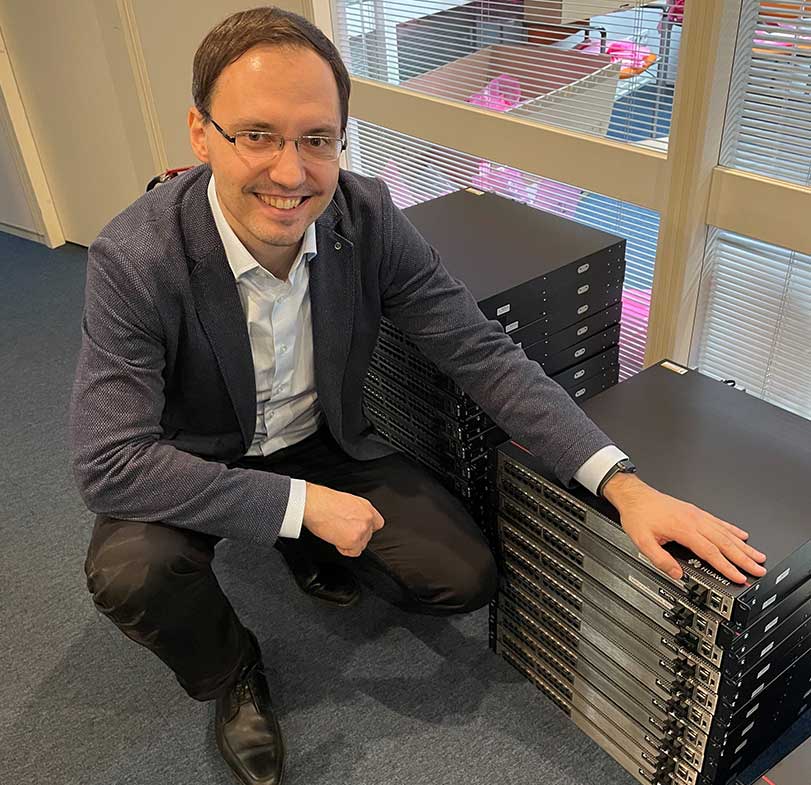Elevating the Education Experience of Hundreds of Schools in Estonia with Huawei's CloudCampus Solution
Productos, soluciones and servicios para los negocios
On a global scale, Estonia has successfully built one of the most advanced digital societies, providing most government, schooling, voting, and healthcare services online. Clearly, in this Baltic country of some 1.3 million people, the Internet is being used to its full potential. It's not surprising, therefore, to discover that Estonian schools have modern digital infrastructure already in place. And it's the country's Education and Youth Board — known as Harno, a government agency of the Ministry of Education and Research — that's responsible for providing the best learning and teaching tools possible, developing and managing information systems, e-services, and Information and Communications Technology (ICT) infrastructure in education.
More widely, overseeing Estonian education and the implementation of general youth policies, Harno's goal is to provide high-quality, modern, and accessible educational opportunities to Estonian citizens, from primary right through to higher education, not just in cities but rural areas as well.
Estonian schools use bandwidth-hungry e-school solutions, from digital databases and textbooks to e-learning materials and digital class diaries and assessments, alongside, of course, a full range of applications and programs. Although nearly every school in Estonia was already connected to the Internet, not all had connections fast and reliable enough to take full advantage of every e-school tool. Indeed, some schools were struggling with limited network capacity, insufficient wired and wireless bandwidth, and poor wireless coverage.
Recognizing the issues, Harno prioritized rolling out the highest quality network connections and renewing the digital infrastructure of every general education and vocational school in the country, to support digital success. This was the beginning of the ambitious Digital Infrastructure Modernization Program, a large-scale project spanning two stages. Initiated by the Ministry of Economic Affairs and Communications in cooperation with the Ministry of Education and Research, the scope of Harno's project encompassed, in total, more than 300 general education and nearly 30 vocational schools, directly impacting over 120,000 students and teachers.
The cooperation between Harno and Huawei began in 2016, with the purchase of 4000 Huawei tablets destined for use in schools. With schoolchildren directly benefiting from this investment in hardware, Harno began to consider Huawei as a long-term partner for digital transformation.

Jüri Saar, Digital Program Manager at Harno
In 2017, after a fierce bidding process, Huawei's CloudCampus Solution was awarded the tender. This solution achieves wired and wireless convergence, offering a consistent network experience, anywhere. For Harno, it included cloud management firewalls, CloudEngine S-Series switches, and iMaster NCE, a management platform supporting network automation and intelligence. iMaster NCE improves Operations and Maintenance (O&M) efficiency, reduces costs, optimizes resource utilization, and ensures responsive, high-availability systems.



Harno also purchased Huawei's AP6000 Series wireless Access Points (APs), which provide speeds of up to 2.53 Gbit/s and are designed for medium to large high-density scenarios, well-suited, therefore, to education: in total, 154 schools were successfully renovated.
The project's second phase began in earnest in March 2020, when schools switched to distance learning models, in response to the pandemic. Once again, Huawei was able to offer a complete solution through a competitive bidding process.
Devices featured in the Huawei solution included CloudEngine S-Series switches, multi GE switches, and HiSecEngine Artificial Intelligence (AI) firewalls. Two kinds of wireless APs were also part of the package, taken from the AirEngine AP7000 range, which is a cutting-edge series of Wi-Fi 6 (802.11ax) APs that delivers ultra-low latency and a device rate of up to 6 Gbit/s, ideal for handling high-bandwidth services. By the end of June 2021, across the project's two stages, the digital infrastructure of 223 general education and four vocational schools in Estonia had already been renewed. And with Huawei's iMaster NCE in place, O&M has become far easier to manage, much faster too, allowing a single engineer to manage some 5000 network devices.
The infrastructure upgrade included the renovation of internal Local Area Networks (LANs), including cabling and equipment, and the deployment of related management and monitoring tools. In addition, school Information Technology (IT) support personnel were taught how to keep their LAN secure. So far, Harno has installed 262 firewalls, 1550 switches, and 4300 Wi-Fi base stations, all chosen from Huawei's product portfolio.
High reliability and high bandwidth, far easier management, wider coverage: these are the key characteristics of the new campus networks constructed by Harno. Students and teachers now enjoy wired and wireless bandwidth that's higher than the legacy system by a factor of 10. In addition, network maintenance workloads have fallen by a factor of five. The solution has improved coverage and capacity across school networks, with CloudCampus offering stable, predictable performance, supporting large groups of users, even under heavy loads.
Taking in the bigger picture, Estonian schools have received a robust and easy-to-manage network that delivers stable Internet access around the clock. This network allows schools to efficiently go about their day, delivering a successful remote learning model to students, also making management tasks far easier.
By 2022, Harno plans to complete the delivery of modern digital infrastructure to every Estonian school and each will see Huawei equipment in place, helping to deliver truly innovative education solutions to a new generation of Estonian children.